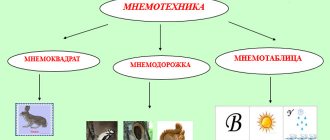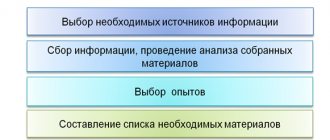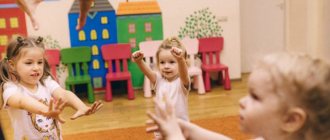Methodological work in kindergarten
Of the various forms of methodological work in kindergarten, such a form as consulting teachers has become especially firmly established in practice.
Individual and group consultations, consultations on the main areas of work of the entire preschool educational institution team, on current problems of pedagogy, at the request of educators.
Methodological work in a preschool institution is a holistic system of interrelated measures, based on the achievements of science and advanced pedagogical experience, aimed at comprehensively improving the qualifications of the teacher.
In the section of the site, methodological work in kindergarten for different groups contains many interesting publications for educators on teaching children on various topics:
- Sample application “On enrollment in kindergarten”
- Consent to the processing of personal data in kindergarten
- Excursion along an ecological trail in a kindergarten using electronic educational resources
- Map of observations of child development in various types of activities of children of primary preschool age
- Poems about kindergarten
- Development of fine motor skills in preschoolers in preschool educational institutions
- Speech at the educational meeting by preschool teachers on the specifics of health-improving work with frequently ill children
- Methodological development of a synopsis of the direct educational field of ecology in kindergarten “Medicinal plants - means of healing the human body”
- Model of organizing the educational process in kindergarten
- Organization of play activities for older preschoolers in the context of the implementation of the Federal State Educational Standard
- Development of fine motor skills in children of primary preschool age using non-traditional methods
- Mini-museum as a means of educating children in kindergarten in Russian national traditions
- Preschool educational institution service and its legal and regulatory support
- Experimentation corner in a kindergarten group
- Continuity of preschool and primary education
- Methodological development of a kindergarten teacher “Poems are always to the aid of children”
In order to improve and achieve the optimal structure of methodological work in a preschool educational institution, it is necessary to understand its essence, its main purpose, leading tasks and functions, and correctly formulate important fundamental requirements for its organization and implementation.
Methodological work in educational institutions of the Russian Federation is part of the system of continuous education.
Methodological work is a holistic system of measures, based on the achievements of science, best practices and analysis of teachers’ difficulties, aimed at improving the skills of each teacher, at generalizing and developing the creative potential of the team, and at achieving optimal results in the education, upbringing and development of children. The goal of methodological work in kindergarten is to create optimal conditions for the continuous improvement of the level of general and pedagogical culture of participants in the educational process. Creating effective conditions for the comprehensive continuous development of children.
Methodological work in a preschool educational institution is a link between the activities of the teaching staff of a preschool institution, the state education system, psychological and pedagogical science, and advanced pedagogical experience.
Methodological service in kindergarten is a comprehensive and creative work, which includes not only practical training of teachers in methods and techniques of working with children, but also increasing the level of knowledge of the latest techniques, studying pedagogy, child psychology, and anatomy. The senior educator, as the head of the methodological service, provides direct assistance to educators and specialists in self-education. Constant updating of the content of methodological work is interconnected with the activities of teachers, which ensures a continuous process of improving the skills of each educator.
Methodological activities of a preschool teacher
In this paragraph you will get answers to the following questions:
· What does the concept of “methodological activity” include?
· What does the teacher’s methodological activity consist of?
· What is the “methodological service” of a preschool educational institution?
· What are the functions of the methodological service of the preschool educational institution and what tasks is it designed to solve?
Methodological activity is usually defined as an activity of generalization and dissemination of pedagogical experience. In the book “Modern School Management,” edited by M.M. Potashnik (M., 1992) defines:
Methodological work is a holistic system of interrelated measures, actions and activities, based on the achievements of science, best practices and a specific analysis of teachers’ difficulties, aimed at comprehensively improving the professional skills of each teacher and educator, at generalizing and developing the creative potential of the teaching staff as a whole, and ultimately - to achieve optimal results in the education, upbringing and development of specific children.
In connection with the identification in the structure of the main general education program of preschool education of the main directions of children's development (physical, cognitive-speech, social-personal, artistic-aesthetic), it is required that preschool educational institutions have specialists who can assist educators and parents in their implementation, taking into account age, individual characteristics of the child, providing an integrated approach to the development of educational areas available to preschoolers. The job responsibilities of such specialists (music director, physical education instructor, speech pathologists, etc.) include methodological functions in certain areas. All these specialists are included in the methodological service of the preschool educational institution.
The methodological service of the preschool educational institution is a unit that provides a set of conditions that develop the professional competence of teachers in the implementation of the basic general education program of preschool education at the level of modern requirements.
The purpose of the methodological service:
· create organizational and pedagogical conditions in the educational institution for the implementation of the basic general education program of preschool education;
· carry out continuous education of teachers;
· develop their creative potential.
The main tasks of the methodological service:
· provide methodological support to participants in the pedagogical process on issues of education, training and development of children;
· plan and organize advanced training and certification of teaching staff;
· identify, study, generalize, disseminate and implement advanced pedagogical experience;
· provide teaching staff with the necessary information about the main directions of development of preschool education, modern requirements for the organization of the pedagogical process, educational and methodological literature on the problems of teaching, upbringing and development of children;
· determine the content of the subject-development environment and educational and methodological equipment of the basic general education program of preschool education;
· conduct pedagogical monitoring.
The methodological service interacts with psychological, medical services, other departments, self-government bodies of preschool educational institutions and works in close relationship with the municipal methodological service.
In pedagogical practice, a whole system of methodological services at different levels has developed. For example: city, district (district) methodological services and methodological service of an educational institution (school, kindergarten). In a preschool educational institution, methodological work is carried out by a senior teacher or deputy head for educational and methodological work.
The task of methodological activity is to create an educational environment in an institution where the creative potential of the teacher and teaching staff would be fully realized.
Experience shows that most teachers, especially beginners, always need help - from more experienced colleagues, managers, senior preschool teachers, and from the professional teaching community. Currently, this need has increased many times due to the transition to a variable education system. Teachers now need special additional training and constant methodological support in order to competently and consciously build a holistic educational process, taking into account the diversity of interests and capabilities of children in the practice of teaching and upbringing.
In August 1994, the Ministry of Education issued a letter “On the forms of organization and areas of activity of methodological services in the education system of the Russian Federation” No. 90-M. The letter highlights the main directions in the activities of methodological services, implemented in such areas as information, diagnostic and prognostic. innovative and experimental, areas of educational content, advanced training, certification.
Thus, methodological activity is an essential component of the educational infrastructure (along with scientific support, training and retraining of personnel, formation of an educational environment, etc.). It is designed to support the normal course of the educational process - to promote its renewal.
The content of the teacher's methodological activity is the creation of work programs; planning educational work with children; creation of visual, didactic and control materials; creating teaching experiences; generalization of “own” work experience in areas of professional activity; participation in scientific and practical conferences and seminars.
The leading areas of methodological activity that directly contribute to the formation of professional competence among teachers are: advanced training, accumulation and generalization of “own” work experience in areas of professional activity.
The system of continuous professional development for each preschool teacher involves different forms: training in courses, studying the experience of teachers, self-education, participation in the methodological work of the city, district, kindergarten. Systematic improvement of the psychological and pedagogical skills of the teacher is carried out in advanced training courses every five years. During the inter-course period of active pedagogical activity, there is a constant process of restructuring knowledge, i.e., the progressive development of the subject himself occurs. And here the decisive role is given to the self-education of the teacher. It performs the following functions: expands and deepens the knowledge acquired in previous course training, promotes understanding of best practices at a higher theoretical level, and improves professional skills.
Self-education is the independent acquisition of knowledge from various sources, taking into account the interests and inclinations of each specific teacher.
In modern conditions, a teacher is primarily a researcher, possessing scientific psychological and pedagogical thinking, a high level of pedagogical skill, a certain research courage, developed pedagogical intuition, critical analysis, the need for professional self-education and the reasonable use of advanced pedagogical experience, i.e. forming its innovative potential.
Motivations for self-education may include the following:
· keep abreast of the latest changes in the science and practice of your professional activities;
· a competitive specialist with opportunities for career growth.
Sources used in the self-education process:
· literature (methodological, popular science, fiction, etc.;
· video and audio information on various media, distance learning;
· courses, seminars and conferences;
· discussions, trainings, briefings, master classes, experience exchange events;
· conducting research and search activities;
· participation in Olympiads and projects;
· study of information and computer technologies;
· involvement in the work of the Internet community in the area of interest in one’s professional activities.
The listed sources of knowledge can contribute to the simultaneous development of personal and professional growth.
In a teacher’s personal plan for self-education, the desired results of work must be predicted .
It can be:
· preparation of articles, reports, scripts;
· participation in scientific, practical and Internet conferences, pedagogical festivals, etc.
· development of new organizational forms and methods of work;
· preparation of the author's partial program;
· conducting trainings, seminars, conferences, master classes, summarizing experience on the problem (topic) under study;
· development of methodological manuals in one or several areas of work;
· development of a set of electronic lessons, united by subject topics or teaching methods;
· development of a set of didactics in the area (visual material, didactic games and manuals);
· creation of a data bank of games, riddles, poems;
· development of a set of thematic parent meetings and events;
· project of a personal methodological web page;
· development of lesson notes using information technology, etc.
The most effective way to show the results of teaching activities is to post materials on the Internet. This allows the teacher to accumulate his work in a virtual pedagogical library, where his colleagues can view it, use its results, add to it, leave feedback and discuss it. In this case, invaluable teaching experience becomes independent of time and space.
Rating assessment of the teacher's methodological activities:
· presence and implementation of a self-education plan;
· introduction of new pedagogical technologies; generalization of one's own experience;
· preparation and holding of an open event (in a traditional form or using innovative technologies);
· visiting and analyzing open events of colleagues;
· participation in the work of methodological associations, pedagogical councils;
· participation in the work of a temporary creative team or research laboratory;
· speeches at scientific, scientific-practical conferences, at pedagogical readings;
· publication of theses and articles; teaching aids, educational and methodological materials (developments, recommendations;
· review of methodological developments;
· participation in competitions of pedagogical and professional skills, in methodological exhibitions;
· preparing students for competitions;
· development of an original program, didactic tools, computer programs;
· leadership of the circle;
· course preparation, internship;
· participation in regional, all-Russian, international programs.
To help the beginning methodologist.
Diana Salyakhova
To help the beginning methodologist.
The effectiveness of a preschool educational institution is determined by the professionally competent activities of the methodological service . This service is determined by the charter of the preschool educational institution and coordinates the work of the preschool educational institution.
Methodological work should be considered an aspect of management and viewed as an activity aimed at ensuring the quality of the educational process of a preschool educational institution. This understanding of methodological work imposes requirements on the formulation of its tasks, characterization of the content and identification of participants.
as general objectives of methodological work: management of the educational process (leader, organization of advanced training for teachers, organization of work with parents.
Responsibility for organizing methodological work lies with the senior teacher. By defining the strategy, goals, objectives of the development and functioning of the preschool educational institution, it influences the specification of the goals, development objectives and content of methodological work .
A teacher-psychologist and teaching specialists participate in the methodological
The most significant aspect of methodological work is the management of the educational process (targeted influence on it to ensure optimal functioning and development).
The goal of methodological work in the operating mode can be formulated as “maintaining the achieved quality of the educational process or optimizing its results”, in the development mode - as “changing the quality of the educational process in accordance with modern trends.”
When solving the problem of managing the functioning of the educational process of a preschool educational institution, the main attention is focused on organizing and monitoring the implementation of the educational program, as well as identifying, studying and generalizing advanced pedagogical experience.
Methodological work must be purposeful, that is, its content and forms must be determined by the goal and objectives.
the senior teacher’s methodological
(according to P. I. Tretyakov, K. Yu. Belaya)
No. Management functions Functions of a senior educator
1 Information and analytical Forms a data bank on the professional qualities of teachers, implementation of programs, teaching experience, new research in pedagogy, psychology, didactics
2 Motivational and goal-oriented Together with the manager and teachers, determines the goals and objectives of the scientific and methodological work of the team , self-education of teachers, forms and methods of educational work in kindergarten.
Helps teachers in the scientific organization of work, creates conditions for this.
Systematizes and promotes advanced pedagogical experience and modern scientific developments
3 Planning and prognostication Predicts the development of the scientific and methodological work of the team . Based on diagnostics, it determines the zones of proximal development for teachers.
Together with the director, he draws up preschool development programs and educational plans, an annual plan, and plans methodological work.
4 Organizational and executive Ensures the implementation of the annual work plan of the kindergarten.
Provides methodological assistance to teachers .
Prepares and conducts meetings of pedagogical councils.
Organizes mutual visits, open classes, competitions, open days.
Conducts diagnostics of children, surveys of teachers, parents, and, together with the director, certification of teachers.
Interacts with schools and other institutions
5 Control and diagnostics Performs, together with the manager, intra-garden control (operational, thematic, final)
: evaluates the quality of the educational process, subject-development environment
6 Regulatory-corrective (operational-functional regulation)
Provides prompt
assistance to teachers in organizing the educational process, advanced training, experimental and research work
Professional requirements
to the senior teacher
The organizers of educational work can be a deputy head or a senior educator. The tariff and qualification characteristics of teaching staff of preschool educational institutions define the responsibilities for these positions. In accordance with the charter, each specific preschool educational institution draws up a staffing table and job descriptions.
The senior teacher is required to have deep, systematized knowledge, and primarily in the field of psychology, pedagogy, management of the educational process, and the teaching staff. He must be able, based on modern requirements for education and upbringing, to set goals and concretize them in the form of tasks that need to be solved in a team; design, plan, regulate and adjust the work of the entire institution; collect and analyze educational and pedagogical information, exercise control, draw conclusions necessary for further forecasting the successful work of the kindergarten. Fulfilling official duties requires the senior educator to constantly improve themselves and creative search in pedagogical and managerial activities.
1. Together with the head, the senior teacher of the preschool educational institution manages the preschool institution, performing the following functions:
— selection of candidates for the positions of educators, their assistants , and specialists;
— creation of a favorable moral and psychological climate in the team, a system of moral and material incentives for employees;
— formulating a social order for your preschool educational institution, developing a philosophy, defining a goal;
— strategic planning, development and implementation of development programs and work plans for preschool educational institutions;
— creating the image of the preschool educational institution among the population;
— selection (development)
educational programs for children;
— organization of educational and educational work with children;
— organization of experimental and research work in preschool educational institutions;
— development and effective use of the intellectual potential of educators and specialists;
— development of cooperation with other preschool educational institutions, schools, children's centers, museums, etc.
2. The senior educator plans educational, methodological work, taking into account the professional skills and experience of educators, providing:
— advanced training of teachers;
— assistance to teachers in self-education;
— certification of teachers;
— drawing up a schedule of classes by age group;
— methodological assistance to educators (primarily beginners )
in preparing and conducting classes;
— exchange of work experience of preschool educational institutions employees;
— familiarizing educators with the achievements of pedagogical theory and practice;
— development of continuity between preschool educational institutions and schools;
— improving work with parents;
— equipping groups with teaching aids, games, toys;
— constant analysis of the state of educational, methodological and educational work and the adoption on its basis of specific measures to increase the effectiveness of methodological work .
3. The senior teacher organizes educational, methodological work , including:
— preparation and regular holding of meetings of the pedagogical council;
— holding open classes, seminars, individual and group consultations, exhibitions, competitions for teachers;
— organizing the work of creative groups;
— timely acquisition of equipment necessary for educational, methodological work ;
— maintaining a card index of published educational, methodological and pedagogical literature;
— acquisition, propaganda among library teachers of educational, methodological and children's literature, manuals, etc.;
— organizing the work of educators in the production of manuals and teaching materials;
— holding joint events with the school;
— preparation of stands and folders for parents about the experience of family education;
— timely preparation of pedagogical documentation;
— formation and generalization of the best experience of teachers on various problems and areas.
4. The senior teacher monitors the work of teachers, consisting of:
— in the systematic verification of plans for educational work;
— attending group classes according to the schedule;
— monitoring the implementation of the annual work plan, decisions made at meetings of the teachers’ council;
— organizing interaction in the work of educators, psychologists, speech therapists, music directors, and other specialists;
— regular diagnostics of children’s development, their knowledge, skills and abilities;
— studying teachers’ plans for self-education.
The senior teacher ensures certain stages of his professional development. And although everyone’s teaching path is different, most senior educators share common characteristics:
— primary assimilation of norms, technologies, forms of activity, necessary techniques
- awareness of one’s capabilities, abilities to fulfill professional standards, approval of an individual style;
— mastering high standards, using previously developed techniques, teaching aids , and technologies at the reproductive level;
— enriching the experience of one’s profession with personal creative contribution, author’s discoveries, and improvements.





